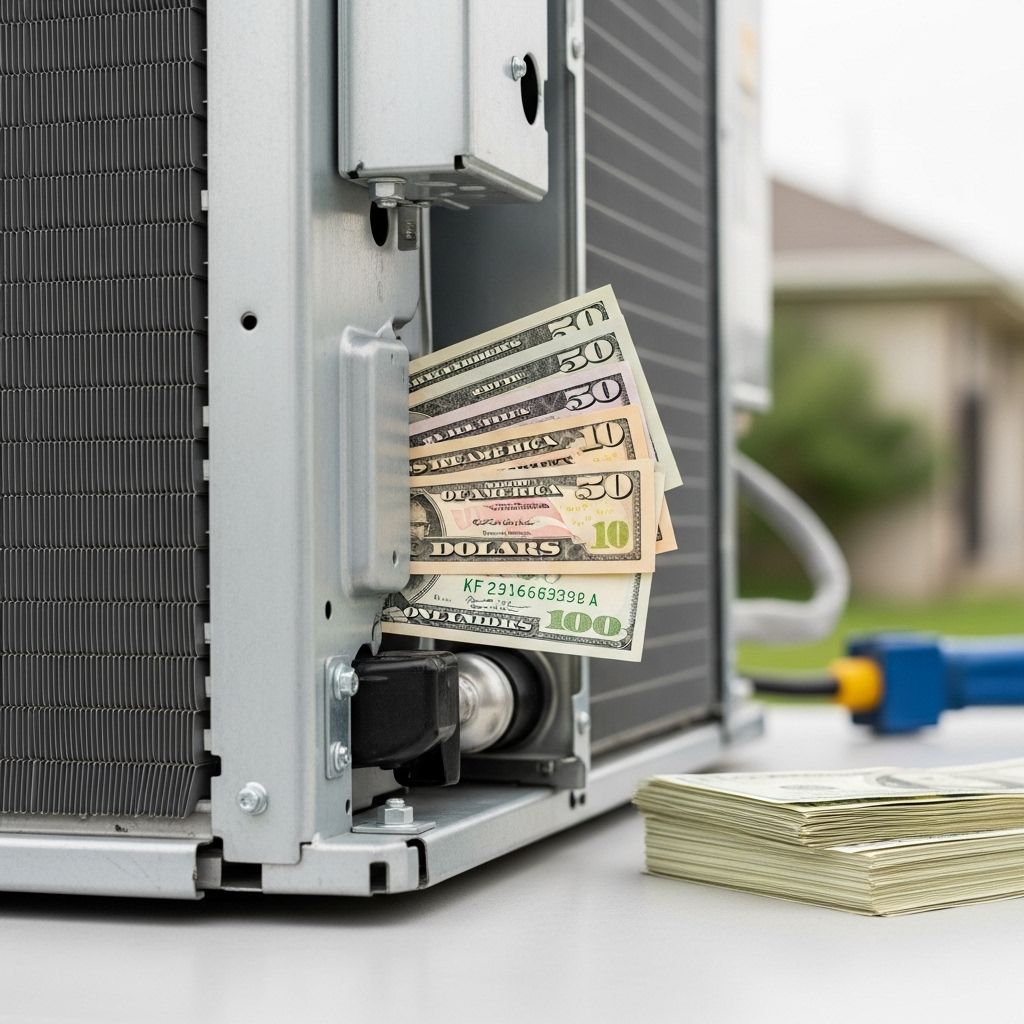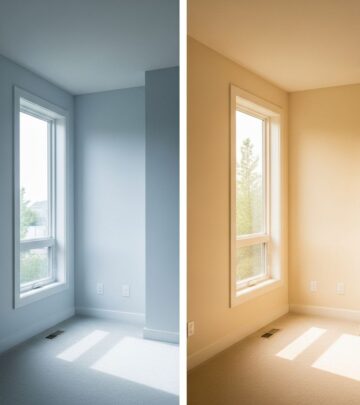AC Condenser Replacement Cost: 6 Ways To Save
Understanding the factors that influence AC condenser replacement costs to help you budget effectively

Image: HearthJunction Design Team
Understanding AC Condenser Replacement Costs
When your air conditioner stops cooling effectively during hot summer months, a failing condenser unit may be the culprit. The condenser—the outdoor unit of your AC system—is crucial for the cooling process, and replacing it represents a significant home maintenance expense. On average, homeowners can expect to pay between $1,200 and $4,200 for a complete AC condenser replacement, with costs varying based on several important factors.
Understanding the components of this cost can help you budget appropriately and potentially save money on this necessary repair. This comprehensive guide breaks down everything you need to know about AC condenser replacement costs, including part-by-part pricing, factors that influence the final bill, and ways to determine whether replacement is truly necessary.
Average AC Condenser Replacement Costs
The overall cost to replace an AC condenser typically falls between $1,200 and $4,200, though the price can go as high as $6,100 for larger, high-efficiency units in certain regions. If your condenser is still under warranty, you might only need to pay for labor costs, which generally range from $300 to $1,200, significantly reducing your financial burden.
Several key factors influence the final price you’ll pay for condenser replacement:
- The size of your AC unit (measured in tons)
- The type of condenser coils in your system
- Your unit’s SEER rating (efficiency standard)
- Brand and model of the replacement parts
- Labor costs in your geographical area
- Whether you need to replace just one component or the entire unit
It’s worth noting that replacing just the condenser rather than the entire AC system may lead to efficiency issues if the indoor and outdoor units aren’t properly matched. Many HVAC professionals recommend replacing both units simultaneously for optimal performance.
AC Condenser Replacement Cost by Part
The condenser unit houses several critical mechanical components of your air conditioning system. When troubleshooting AC problems, HVAC technicians often determine that only specific parts need replacement rather than the entire condenser unit. Here’s a breakdown of replacement costs for individual condenser components:
| Condenser Part | Material Cost |
|---|---|
| Capacitor | $220–$500 |
| Compressor | $1,000–$2,500 |
| Condenser coil | $850–$2,700 |
| Condenser fan blade | $100–$200 |
| Condenser fan motor | $200–$700 |
| Contactor | $175–$400 |
| Full condenser unit | $850–$3,000 |
| Relay switch | $75–$300 |
The compressor and condenser coils are typically the most expensive components to replace. If either of these parts fails and your system is aging or out of warranty, it often makes financial sense to replace the entire condenser unit rather than just the malfunctioning part.
AC Condenser Replacement by Coil Type
The condenser coils play a vital role in your air conditioning system. Refrigerant heats up into gas before passing through these coils and cooling back down to liquid form. Coils come in different designs, each with varying efficiency levels, durability characteristics, and price points:
| Coil Type | Average Cost | Characteristics |
|---|---|---|
| Fin-and-tube | $850–$1,300 | Most common, least expensive, lower efficiency, more prone to damage |
| Spine-fin | $1,400–$2,700 | Better efficiency, less prone to leaking, limited brand availability |
| Micro-channel | $2,500–$5,500 | Highest efficiency, requires less coolant, highly corrosion-resistant, most expensive |
While fin-and-tube coils are the most budget-friendly option upfront, they may cost more in the long run due to lower energy efficiency and higher maintenance needs. Micro-channel coils, despite their higher initial cost, often provide greater energy savings and longer service life.
AC Condenser Replacement Cost by Unit Size
Air conditioning systems are sized according to their cooling capacity, measured in tons (one ton equals 12,000 BTUs per hour). The size of your AC unit significantly impacts replacement costs—larger units cool bigger spaces but cost more to purchase and install. Here’s a breakdown of condenser replacement costs by unit size:
| AC Size in Tons | Average Cost (Materials and Labor) | Typical Home Size |
|---|---|---|
| 1.5 | $1,300–$2,200 | 600-900 sq. ft. |
| 2 | $1,350–$2,500 | 900-1,200 sq. ft. |
| 2.5 | $1,500–$2,800 | 1,200-1,500 sq. ft. |
| 3 | $1,850–$3,000 | 1,500-1,800 sq. ft. |
| 3.5 | $1,700–$3,500 | 1,800-2,100 sq. ft. |
| 4 | $1,980–$4,000 | 2,100-2,400 sq. ft. |
| 4.5 | $2,100–$4,500 | 2,400-2,700 sq. ft. |
| 5 | $2,150–$5,000 | 2,700-3,000+ sq. ft. |
It’s crucial to install the correctly sized unit for your home. An undersized condenser won’t cool effectively, while an oversized unit will cycle on and off frequently, reducing efficiency and potentially shortening the system’s lifespan.
Factors Affecting AC Condenser Replacement Costs
Several variables beyond the basic equipment costs can influence what you’ll pay for an AC condenser replacement:
SEER Rating
The Seasonal Energy Efficiency Ratio (SEER) measures your air conditioner’s energy efficiency. Higher SEER ratings indicate more efficient units that cost more upfront but save on energy bills long-term. Modern units typically range from 13-21 SEER, with higher-efficiency models costing 25-40% more than standard efficiency units.
Labor Costs
Labor typically accounts for 30-50% of the total replacement cost. Rates vary by location, with urban areas generally commanding higher prices than rural regions. Most HVAC technicians charge between $75 and $150 per hour, with condenser replacements typically requiring 4-8 hours of labor.
Refrigerant Type and Costs
The refrigerant used in your system affects both performance and cost. R-410A (Puron) has replaced R-22 (Freon) in most modern systems due to environmental regulations. If your older system uses R-22, you may need to upgrade to a new system compatible with R-410A, as R-22 is increasingly expensive and difficult to obtain.
Warranty Coverage
Most new condensers come with manufacturer warranties ranging from 5-10 years for parts. Extended warranties are often available for additional cost. If your existing unit is still under warranty, replacement part costs might be covered, leaving you responsible only for labor charges.
Seasonal Timing
HVAC companies typically charge premium rates during peak seasons (summer and winter) when demand is highest. Planning your replacement during spring or fall can often result in discounted rates and more flexible scheduling options.
Signs You Need AC Condenser Replacement
Before investing in a new condenser, it’s important to determine whether replacement is truly necessary. Here are common indicators that your condenser may need replacement:
- Age of the unit: Most condensers last 10-15 years. If yours is approaching this age range and experiencing problems, replacement might be more cost-effective than repair.
- Frequent repairs: If you’ve needed multiple repairs in recent years, continuing to fix an aging system may exceed the cost of replacement.
- Reduced cooling efficiency: When your AC struggles to maintain comfortable temperatures despite being in good working order, the condenser may be failing.
- Unusual noises: Grinding, scraping, or rattling sounds often indicate serious mechanical issues with the condenser unit.
- Refrigerant leaks: Persistent leaks suggest problems with the condenser coils that may warrant replacement.
- High energy bills: Unexplained increases in electricity consumption often signal declining condenser efficiency.
If you’re experiencing multiple issues simultaneously, it’s wise to consult with a professional HVAC technician who can evaluate whether repair or replacement represents the better value.
DIY vs. Professional AC Condenser Replacement
While replacing certain components like capacitors or contactors might be within reach of skilled DIY homeowners, full condenser replacement typically requires professional expertise. Here’s why professional installation is generally recommended:
- HVAC systems require proper handling of refrigerant, which is regulated by the EPA and requires certification
- Incorrect installation can void manufacturer warranties
- Professionals ensure proper sizing, electrical connections, and system balance
- Improper installation can lead to efficiency losses of 30% or more
- Professional installation includes testing and calibration for optimal performance
If you’re considering DIY replacement of minor components, always ensure you disconnect power to the unit before attempting any repairs, and consult manufacturer documentation for your specific model.
Ways to Save on AC Condenser Replacement
While condenser replacement represents a significant expense, several strategies can help reduce costs:
- Obtain multiple quotes: Contact at least three reputable HVAC companies for estimates
- Schedule during off-peak seasons: Spring and fall typically offer better pricing and availability
- Check for rebates: Utility companies and manufacturers often offer rebates for energy-efficient replacements
- Explore tax credits: Federal, state, or local tax incentives may be available for high-efficiency systems
- Consider home warranty coverage: If applicable, your home warranty might cover part of the replacement cost
- Maintenance plans: Some HVAC companies offer discounts to customers enrolled in regular maintenance programs
Remember that the cheapest quote isn’t always the best value. Ensure any contractor you hire is licensed, insured, and experienced with your specific type of system.
Frequently Asked Questions (FAQs)
How long does an AC condenser typically last?
With proper maintenance, an AC condenser typically lasts between 10-15 years. Units in coastal areas may have shorter lifespans due to salt air exposure, while those in milder climates might last longer. Regular maintenance, including annual professional servicing, can significantly extend a condenser’s useful life.
Should I replace just the condenser or the entire AC system?
If your AC system is less than 10 years old and the indoor components are functioning well, replacing just the condenser might make sense. However, if your system is older, uses R-22 refrigerant, or has other components showing wear, replacing the entire system often provides better efficiency and prevents potential compatibility issues between old and new components.
What SEER rating should I choose for a replacement condenser?
The minimum SEER rating for new AC systems is 14 in northern states and 15 in southern states as of 2023. While higher SEER ratings (16-21) cost more upfront, they can significantly reduce energy bills, especially in hot climates with extended cooling seasons. For moderate climates with shorter cooling seasons, a 14-16 SEER unit often provides the best balance of upfront cost and energy savings.
How can I tell if my AC condenser is failing?
Common signs of condenser failure include: warm air blowing from vents, unusual noises from the outdoor unit, frequent system cycling, high electric bills without increased usage, refrigerant leaks around the outdoor unit, and the system tripping circuit breakers. If you notice multiple symptoms, have a professional HVAC technician evaluate the system.
Is it worth repairing an old AC condenser?
As a general rule, if repairs would cost more than 50% of a new unit or if your existing unit is over 10 years old, replacement is usually more economical. Additionally, if your unit uses R-22 refrigerant, which is being phased out, replacement with a modern R-410A system is typically recommended, as R-22 costs continue to increase substantially.
References
- https://www.thisoldhouse.com/heating-cooling/reviews/ac-condenser-replacement-cost
- https://todayshomeowner.com/hvac/cost/ac-condenser-replacement-cost/
- https://repairpal.com/estimator/ac-condenser-replacement-cost
- https://homeguide.com/costs/ac-condenser-replacement-cost
- https://www.angi.com/articles/replace-ac-condenser-cost.htm
Read full bio of Anjali Sayee










